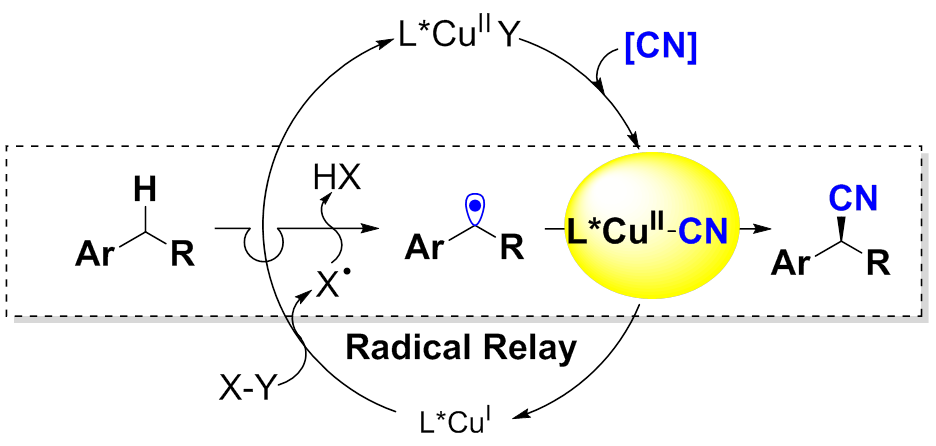Eantioselective C-H functionalization of sp3-hybridized carbon-hydrogen bonds in complex organic molecules is of great importancein modern synthetic chemistry, especially for asymmetric synthesis in the foreseeable future, but with great challenging. Recently, a break though on this formidable issue have been made by the team led by Guosheng Liu from the Shanghai Institute of Organic Chemistry (SIOC), Chinese Academy of Sciences(CAS) and Shannon S. Stahl fromthe University of Wisconsin-Madison. An efficient approach hasbeen developed to directly convert hydrocarbons into enantiomeric enriched nitriles, which are privileged in pharmaceuticals and agricultural chemicals. Inspired by C-H bond hydroxylation and halogenation, catalyzed by enzymatic oxygenases and halogenases, such as cytochrome P450 and non-heme iron enzymes, Guosheng Liu’s research group discovered a copper/bisoxazoline system to achieve enantioselective functionalization of benzylic C–H bonds with high efficiency. However, distinct from "radical rebound" in enzymatic catalysis, the present protocol proceeded via a “radical relay” process, and exhibited excellent stereo-control on the reactive radical intermediate. All these reaction underwent smoothly at room temperature with the benzylic substrateas limiting reagent with excellent chemo-, regio- and enantioselectivity (typically90% to 99% ee). Meanwhile, broad substrate scope and excellent functional group compatibility were observed. The features provides the key foundation for the pursuit of other highly selective C-H oxidation reactions. 
Radical Relay Process for Enantioselective C-H Cyanation(Imaged by LIU Guosheng) This research has been published as a report in Science (Science, 2016, 353, 1014). National Basic Research Program of China (973-2015CB856600), the National Natural Science Foundation of China (Nos. 21225210,21421091, 21532009 and 21472217) provided the financial support for the present work. Contact: Prof. LIU Guosheng Shanghai Institute of Organic Chemistry (SIOC), Chinese Academy of Science (CAS) E-mail: gliu@mail.sioc.ac.cn |


